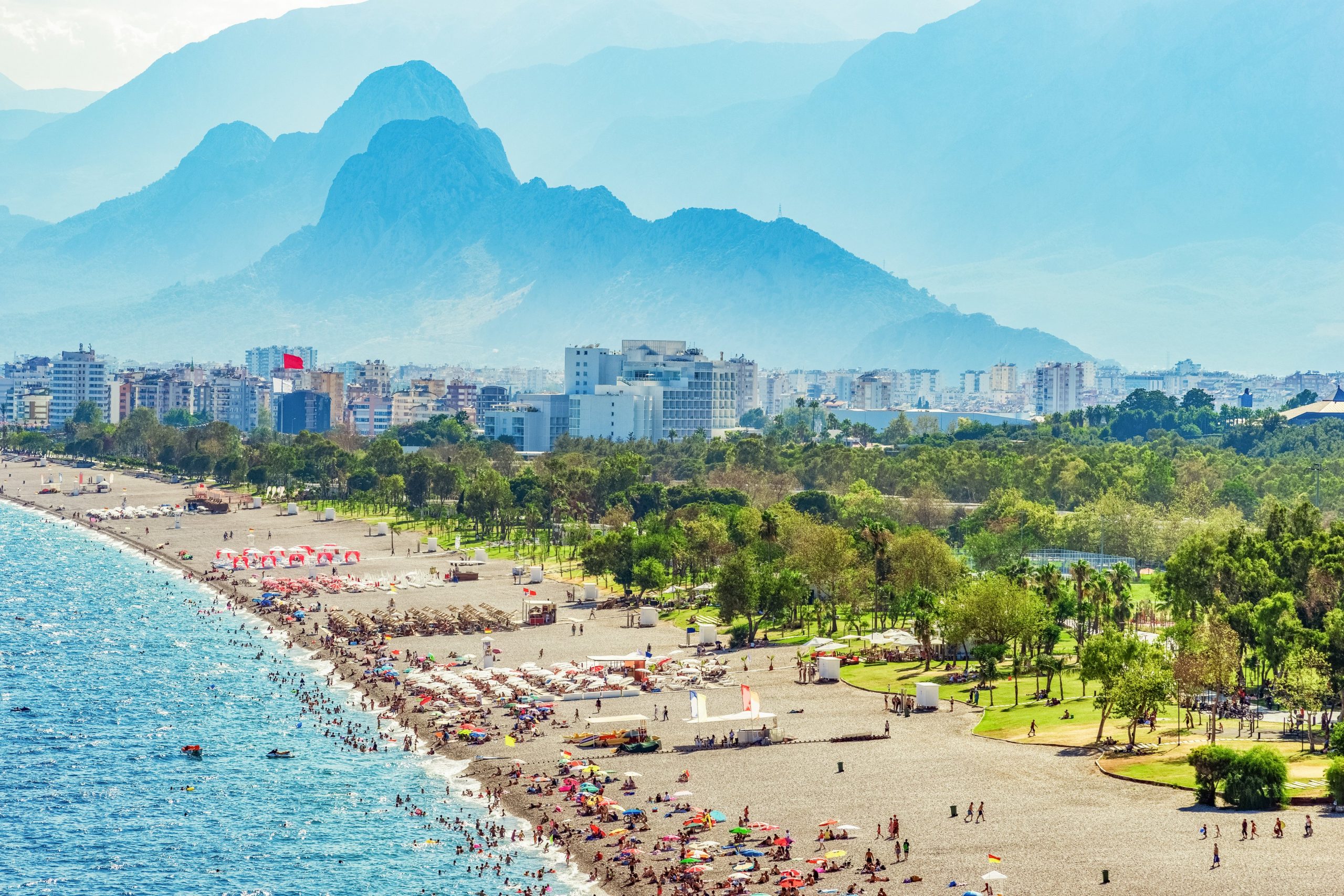A popular holiday resort for people of Ukraine and Russia, Turkey’s southern province of Antalya has become a frequent destination for many digital nomads who work remotely.
It is understood from the crowded cafes that more people from Russia and Ukraine have come to Turkey following Russia’s invasion of Ukraine. Many people work at cafes with their computers.
According to the Turkish Statistical Institute, 16,724 people from Russia and 6,710 people from Ukraine reside in Antalya. These numbers have been growing since the war began.
Tatiana Radchuk
“The war showed the difference between the people of the two countries”
“The war showed the difference between the people of the two countries”
Tatiana, a 26-year-old woman from Ukraine, works as a human resources specialist at a Ukraine-based software company. She has had the opportunity to live in various cities in Europe, but says Antalya is different for her. She likes the culture, nature and people in Antalya. “The Turkish people are open to communication and helpful,” she says.
People in Ukraine have been united since the war began and many people whom she knows don’t want to leave their country, says Radchuk.
“My family lives in the city of Lutsk, which is near the border with Poland in Ukraine’s west. There is no military intervention in Lutsk. I offered my family to settle in Antalya, but it is hard for them to leave their home and country. They said they didn’t want to leave until there was military intervention. My mother says she will acquire weapons if necessary and protect her home and country.”
Radchuk feels lucky for currently being in Antalya.
“I feel the support of my Turkish friends. They call me, they ask about my family in Ukraine. Here, we are collecting aid for Ukraine under the umbrella of the Ukrainian Family Association. It makes me happy to see Turks and Ukrainians working together in fundraising. The association has a very large building in Antalya and hosts Ukrainians who came to Antalya after the war.”
Kateryna
“I don’t want to get used to war”
“I don’t want to get used to war”
She remotely works as a social media specialist.
“I was in Barcelona when the war began. I wasn’t able to go back to my country. One of my friends called and said, ‘You can come to Antalya, we have a place for you here.’ I am grateful to the city of Antalya and its people, and I feel pretty safe in this city.”
“I know my friends who had to flee Ukraine, the bombed cities, the people who died, and the war as much as they told me. What happened is truly terrible. I want the war to end as soon as possible. I don’t want to get used to a constant war in my country.”
Mikhail
“Sanctions have changed people’s lives”
“Sanctions have changed people’s lives”
Aged 36, he is the founder of a company selling environment friendly products and an executive at a software company. He is in Antalya with his wife and two children. He didn’t want this last name to be disclosed as he still has contact with Russia.
They decided to move to another country when they realized the rapid change in their country after Russia attacked Ukraine on February 24 would change the lives of many people in their country. However, they wouldn’t even know how to leave the country because airports were closed for a while.
“Many Russians who have the opportunity to work remotely have left their country. The sanctions imposed on Russia have changed the lives of many people. With the withdrawal of Mastercard and Visa from Russia, Russia-based e-commerce companies making global sales were closed. I know that people I know from Russia also came to Antalya.
“Since Russia’s invasion of Ukraine, many US and European companies have left Russia. The use of social media platforms Facebook and Instagram is now associated with extremism by the Russian authorities.”
Mikhail went to university in the US, and after finishing school, he and his wife worked in the US for a while. Under the influence of “exciting technological developments in Russia,” he and his wife returned to their country in 2013.
“Since the 2014 economic crisis in Russia, the economic and political climate has deteriorated. Since then, we have always had the thought of moving from Russia at the back of our minds; this thought turned into a decision after February 24.”
Lana Sukhoverska
“Three sisters don’t talk to each other anymore”
“Three sisters don’t talk to each other anymore”
She is a content manager at a UK-based company. She works remotely. She lived in many countries and cities at brief intervals, loved Antalya so much after visiting it for the first time a year ago, and decided to live there when she visited the city the next time.
She said her mother lives in a small city named Ladan, which is about 200 kilometers from Kyiv and Belarus, and is unable to leave the country because of her health problems.
“There hasn’t been any conflict in Ladan for now. Since the beginning of the war, night curfews and blackouts have been implemented in the city. The inhabitants of the city, on the other hand, try to protect the city against any attack by placing barricades at the entrance of the city and patrolling at night.
“Because there is no cash left in ATMs and it is not possible to pay with cards in every market, people in Ladan have been having trouble shopping since the start of the war.”
The breaking point
Sukhoverska explains how the war in Ukraine brought the kinship ties between people from Russia and Ukraine to the breaking point:
“A few days ago, my mother talked about an incident. Among three sisters whom she knows, one lives in the US, one lives in Ukraine and one lives in Moscow. The sisters living in Ukraine and Russia quickly fell into a conflict and stopped talking to each other.
“When the one in the US called the one in Moscow, another conflict arose. The sister in Moscow ended the conversation with her sister, saying that the western media lied to them, and what was happening in Ukraine was not a war that harmed civilians, but only a military intervention.”
The media
Mikhail points out that the media in Russia under “government control” creates the perception that “what happened in Ukraine is not a war but only a military operation”, there are difficulties in accessing news amid propaganda.
“The Russian government does not allow even the smallest peaceful protest. Holding banners that read ‘no to war’ or just ‘peace’ or holding a rally is completely prohibited right now.
“The only thing that people living in Russia can see is the news allowed by the government. People can still access different media channels over the internet using tools like VPN, but I’m sure there are people who don’t even have knowledge of different media channels.”
The internet
Sukhoverska agrees with Mikhail, to a point. She says the people of Russia still have an important tool against propaganda: the internet.
“In Russia, under Putin’s 20-year rule, the people were brainwashed and they started living in a world Putin created, but I also know that people still have access to the internet. They can make efforts to access news other than propaganda.”
Crimea
Everything started when Russia annexed Crimea in “almost 10 minutes,” according to Sukhoveska.
“At the time, we, the Ukrainians, were busy with the Maidan protests. Ukraine didn’t have enough military power and Crimea was so easily allowed to come under Russia’s sovereignty.
“The Russians then came for the regions of Donetsk and Luhansk. There should have been resistance from Ukraine. Countries that are part of world politics should have imposed sanctions on Russia, but the world remained silent. The Russians thought they could take over Ukraine step by step. (SNS/APK/HA/VK)
Source:Bianet
***Show us some LOVE by sharing it!***



